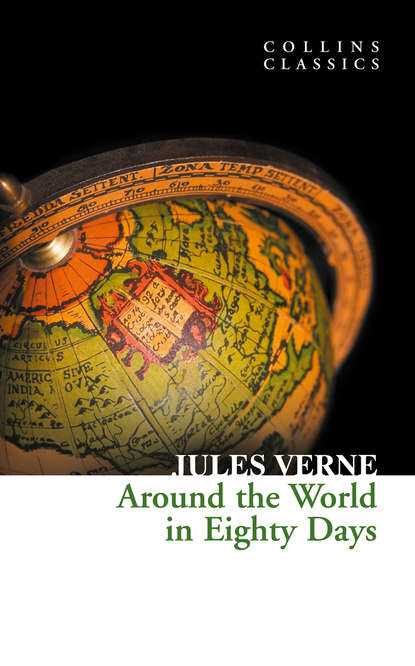“And why not? If his passport is regular I have no sight to refuse my visé.”
“But, Consul, I must retain this man until I have received from London a warrant of arrest.”
“Ah, Mr Fix, that is your business,” replied the Consul, “but I—I cannot—”
The Consul did not finish his phrase. At this moment there was a knock at the door of his private office, and the office boy brought in two foreigners, one of whom was the very servant who had been talking with the detective. They were, indeed, the master and servant. The master presented his passport, asking the Consul briefly to be kind enough to visé it. The latter took the passport and read it carefully, while Fix, in one corner of the room, was observing or rather devouring the stranger with his eyes.
When the Consul had finished reading, he asked:
“You are Phileas Fogg, Esq.?”
“Yes, sir,” replied the gentleman.
“And this man is your servant?”
“Yes, a Frenchman named Passepartout.”
“You come from London?”
“Yes.”
“And you are going?”
“To Bombay.”
“Well, sir, you know that this formality of the visé is useless, and that we no longer demand the presentation of the passport?”
“I know it, sir,” replied Phileas Fogg, “but I wish to prove by your visé my trip to Suez.”
“Very well, sir.”
And the Consul having signed and dated the passport, affixed his seal, Mr Fogg settled the fee, and having bowed coldly, he went out, followed by his servant.
“Well?” asked the detective.
“Well,” replied the Consul, “he has the appearance of a perfectly honest man!”
“Possibly,” replied Fix; “but that is not the question with us. Do you find, Consul, that this phlegmatic gentleman resembles, feature for feature, the robber whose description I have received?”
“I agree with you, but you know that all descriptions—”
“I shall have a clear conscience about it,” replied Fix.
“The servant appears to me less of a riddle than the master. Moreover, he is a Frenchman, who cannot keep from talking. I will see you soon again, Consul.”
The detective then went out, intent upon the search for Passepartout.
In the meantime Mr Fogg, after leaving the Consul’s house, had gone towards the wharf. There he gave some orders to his servant; then he got into a boat, returned on board the Mongolia, and went into his cabin. He then took out his memorandum book, in which were the following notes:
“Left London, Wednesday, October 2, 8.45 p.m.
“Arrived at Paris, Thursday, October 3, 7.20 a.m.
“Left Paris, Thursday, 8.40 a.m.
“Arrived at Turin, via Mont Cenis, Friday, October 4, 6.35 a.m.
“Left Turin, Friday, 7.27 a.m.
“Arrived at Brindisi, Saturday, October 5, 4 p.m.
“Set sail on the Mongolia, Saturday, 5 p.m.
“Arrived at Suez, Wednesday, October 9, 11 a.m.
“Total of hours consumed, 158 1-2; or in days, 6 1-2 days.”
Mr Fogg wrote down these dates in a guide-book arranged by columns, which indicated, from the 2nd of October to the 21st of December—the month, the day of the month, the day of the week, the stipulated and actual arrivals at each principal point, Paris, Brindisi, Suez, Bombay, Calcutta, Singapore, Hong-Kong, Yokohama, San Francisco, New York, Liverpool, London, and which allowed him to figure the gain made or the loss experienced at each place on the route. In this methodical book he thus kept an account of everything, and Mr Fogg knew always whether he was ahead of time or behind.
He noted down then this day, Wednesday, October 9, his arrival at Suez, which agreeing with the stipulated arrival, neither made a gain or a loss. Then he had his breakfast served up in his cabin. As to seeing the town, he did not even think of it, being of that race of Englishmen who have their servants visit the countries they pass through.
CHAPTER 8 (#ulink_a4d82eb5-126e-57fb-874a-657d4b445156)
In which Passepartout perhaps talks a little more than is proper
Fix had in a few moments rejoined Passepartout on the wharf, who was loitering and looking about, not believing that he was obliged not to see anything.
“Well, my friend,” said Fix, coming up to him, “is your passport viséd?”
“Ah! it is you, monsieur,” replied the Frenchman.
“Much obliged. It is all in order.”
“And you are looking at the country?”
“Yes, but we go so quickly that it seems to me as if I am travelling in a dream. And so we are in Suez?”
“Yes, in Suez.”
“In Egypt?”
“You are quite right, in Egypt.”
“And in Africa?”
“Yes, in Africa?”
“In Africa?” repeated Passepartout. “I cannot believe it. Just fancy, sir, that I imagined we would not go farther than Paris, and I saw this famous capital again between twenty minutes after seven and twenty minutes of nine in the morning, between the northern station and the Lyons station, through the windows of a cab in a driving rain! I regret it! I would have so much liked to see again Père Lachaise and the Circus of the Champs-Elysées!”








 Рейтинг:
0
Рейтинг:
0